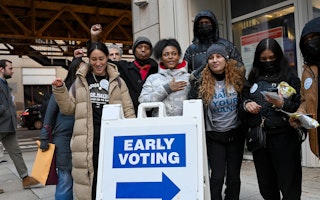Advocating for Immigrant, Human, and Civil Rights on the Northern Border
By Ryan Bates
Southwest Detroit is one of Detroit’s most vibrant neighborhoods.
A long-standing Mexican and Chicano community rubs elbows with more recent immigrants from Guatemala, the Dominican Republic, Nicaragua, Lebanon, Yemen, and many different points from across the globe. At least 42 different nations are represented in Southwest.
In a city that has struggled as of late, Southwest Detroit is a bright spot. The neighborhood has many of things that are just memories for many Detroit enclaves – commercial districts buoyed by locally-owned small businesses, grocery stores that residents can walk to, and good neighborhood schools. Troubled blocks are being rebuilt, house-by-house, by enterprising immigrant families. Southwest Detroit certainly has its challenges, but the streets are busy with people working, selling and building. The American Dream is alive and well for the working-class immigrants who make this neighborhood home.
Southwest Detroit is also home to the Ambassador Bridge, the nation's busiest border crossing (note to the geographically inclined: Detroit is actually due north of Canada). The accompanying security presence sometimes makes the area feel like an armed camp. Border Patrol and Field Operations officers assigned to the bridge regularly cruise the neighborhoods, or stop residents for "voluntary questioning" as they drive to school or work.
Border Patrol agents have been busy-- conducting enforcement operations in the past several years at or around Latino Family Services (a local food pantry and counseling center), St. Anne's Church (a historic parish whose members are 90 percent Latino), and the Detroit Hispanic Development Corporation (a youth center that hosts regular teen dances).
The harassment is continual.
Take for example the case of Ruben Torres. In 2011, Border Patrol agents pulled Ruben over to the side of the road and questioned him for nearly an hour. They claimed that his visa was expired and that he needed to explain what he was doing in the country illegally. Ruben explained that he was born in Detroit, but the agents kept demanding to see his visa. Ruben tried to explain that the only visa he had ever had was his credit card. He was eventually released, but not after being treated like a threat to the city he's called home for decades.
In the national debate over immigration reform and border security, it is voices like Ruben's that are lost.
Sadly, the ever-increasing enforcement presence in Southwest Detroit is driving many away, out towards the suburbs, sapping vitality and population away from a city that desperately needs it.
It is the experiences of the community of Southwest Detroit that spurred the creation of the Northern Borders Coalition. Groups from New York, to Ohio, Michigan, Washington, and across the country realized together that our struggle was not isolated – we were dealing with a systematic failure by the Department of Homeland Security that was consistently undermining both our civil rights and national security.
As the debate on comprehensive immigration reform moves forward, we'll be working to make sure that voices from the border, voices like Ruben Torres, get heard.
Ryan Bates is the director of Michigan United and co-chairs the Northern Borders Coalition with One America of Washington and the New York Immigration Coalition.


